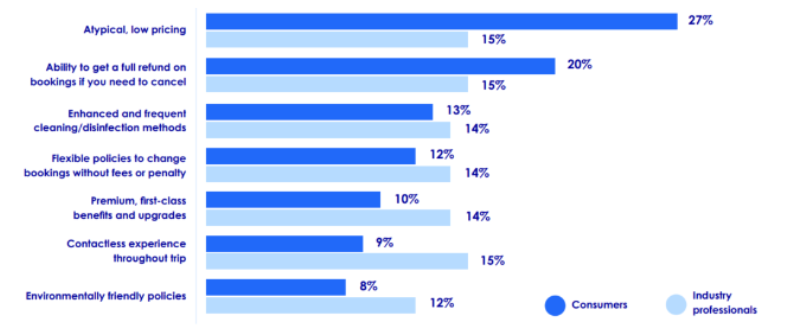With changes in the global economy, new digital trends, and the effects of the pandemic, traveler behavior has evolved significantly. Both consumers and tourism professionals prioritize different aspects, and understanding these priorities is crucial for those looking to adapt their services to new demands. In this article, we will break down current trends and expectations in the travel industry, focusing on what travelers value most today. The information is based on a recent report analyzing the most important factors in the travel experience, highlighting preferences from low prices to sustainable experiences.
Travelers’ Top Priorities and Industry Trends
Today’s travelers are not just looking for a destination but for a comprehensive experience that aligns with their values and preferences. Below, we explore the factors they value most when making travel decisions, such as value for money, flexibility, and sustainability. Understanding these factors enables tourism companies to develop more attractive and competitive offerings.

Low Prices and Exceptional Deals
For 27% of consumers, finding low prices and exceptional deals is essential when planning their trips. This trend reflects a concern for savings and greater cost sensitivity, especially in an uncertain economic context. Many travelers choose to cut back on transportation and accommodation expenses to allocate a larger part of their budget to experiences and activities at the destination. In response, companies have increased the use of discount strategies, loyalty programs, and promotional packages to capture this segment’s attention. Travelers are increasingly using platforms and apps that help them compare prices and find the best deals.
The Importance of Cleanliness and Health Safety
Following the pandemic, cleanliness and safety standards have gained unprecedented relevance. This aspect not only reassures travelers but has also established a new standard in the industry, where hygiene and safety expectations are now higher.
Enhanced and Frequent Cleaning Methods
Cleanliness has become an essential requirement for 13% of consumers and 14% of industry professionals. The pandemic prompted a transformation in cleaning methods, with many companies implementing regular disinfection in common areas like lobbies, elevators, and reception areas. Today, many hotels and tourism services even provide personal hygiene kits in rooms and communicate their cleaning protocols to guests as a trust-building measure. This priority has shifted from being a mere added value to a basic requirement that many customers are unwilling to compromise on.
Contactless Travel Experience
Fifteen percent of professionals and 9% of consumers appreciate contactless travel experiences, thanks to technological advancements enabling digital check-ins, virtual room keys, and contactless payments. These innovations minimize physical interaction, making travel safer and also streamlining the user experience. Additionally, contactless solutions allow companies to better manage resources and optimize employee time, which is beneficial for both efficiency and customer experience.
Preferences for High-Quality and Sustainable Experiences
As travelers become more conscious of the impact of their choices, sustainability and quality in travel experiences are gaining prominence. Consumers seek enriching experiences that also respect the environment and contribute to preserving destinations.
Premium Benefits and Upgrades
While most travelers are cost-conscious, there is a segment that values premium benefits, with 10% of consumers and 14% of professionals prioritizing this aspect. These travelers look for high-quality, personalized experiences and are willing to pay more for exclusive treatment. Premium benefits, such as VIP lounge access, personalized concierge service, and accommodation upgrades, offer travelers a differentiated, more comfortable experience. Companies offering these services can better capture the attention of high-income clients seeking a unique and personalized experience.
Environmentally Friendly Policies
Eight percent of consumers and 12% of professionals consider sustainable practices crucial when choosing a tourism company. Growing concern about climate change has led many travelers to prefer companies committed to environmental preservation, reducing their ecological footprint through practices like waste minimization, renewable energy use, and plastic reduction. More and more tourism companies are integrating sustainable policies and promoting eco-friendly labels to attract customers who value sustainability. This approach allows brands to stand out in a competitive market and connect with a more conscious and committed audience.
Flexibility as a Central Pillar in the Booking Process
Flexibility now extends beyond cancellation policies to include the ability to make changes without penalty and adapt to travelers’ needs in real-time. This approach is valued by both consumers and professionals alike.
Flexible Policies for Penalty-Free Changes
Flexibility in change and cancellation policies is a crucial factor for both travelers and tourism professionals. Twelve percent of consumers and 14% of professionals find it essential to modify bookings without penalties, while 20% of professionals and 15% of consumers highly value cancellation policies that allow refunds or free changes. In times of constant change and uncertainty, these factors have become indispensable. Many companies have adopted flexible policies offering adjustable rates or even subscriptions with unlimited changes, which not only meets travelers’ current needs but also strengthens customer loyalty and the relationship between the user and the brand, providing a service adapted to changing circumstances.
Analyzing the Differences Between Consumers and Industry Professionals
Tourism professionals and consumers share some priorities but also show significant differences in certain aspects. While consumers focus on low prices and flexible policies, professionals value contactless technology and premium services. These differences reflect each group’s perspective, and finding a balance between both is essential for tourism companies’ success.
Companies need to understand both segments’ priorities to create offerings that satisfy everyone. For example, combining accessible prices with premium options allows them to attract consumers with varying budgets and expectations. Moreover, adapting service offerings to meet demands for flexibility and sustainability is key to building traveler trust and standing out in a competitive market.

Traveler behavior and expectations have significantly changed in recent years. The preference for low prices, demand for flexible cancellation policies, emphasis on cleanliness, and sustainable practices are just some of the factors shaping today’s travel landscape. These changes in expectations present both a challenge and an opportunity for the tourism industry.
To thrive in the current environment, companies must adapt to new market demands and provide experiences that meet consumers’ needs. This involves a focus on flexibility, sustainability, and contactless technology, all aimed at a travel experience that is not only comfortable but also memorable and respectful of the environment. By aligning with these trends, tourism companies will be better positioned to gain traveler loyalty and achieve sustainable growth over time.






